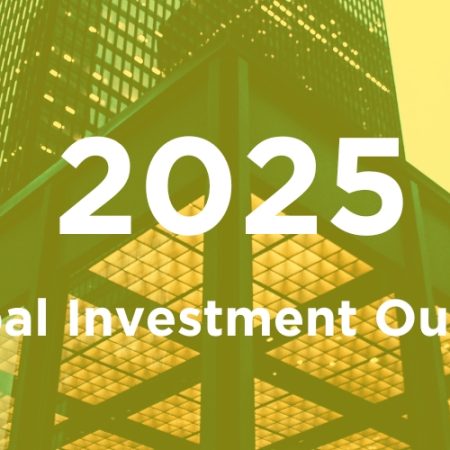2025 marks five years since the full onset of the Covid-19 pandemic, a period of significant upheaval and market change. This backdrop of change will continue to define markets, but for the first time in five years, there is more stability, and perhaps more conviction, in the economic outlook. This will put markets on a surer footing, boosting investment and market activity.
With fears of a global recession receding, a soft landing is anticipated. Rising wages, strong employment, and lower inflation are boosting household incomes, creating a positive cycle of consumer spending, confidence, and investment. Growth momentum is set to shift from the US to Europe, while Asia is set to benefit from a cyclical upturn driven by strong trade growth.
This, coupled with easing financial conditions and interest rate cuts across many regions, is driving global equity markets to record highs, supporting a rebound in real estate activity. We forecast global real estate investment turnover will rise 27% to $952 billion in 2025. By 2026, this figure will surpass the $1 trillion mark for the first time since 2022.
Property with purpose
The economy is the top-ranking factor set to drive property markets in 2025 – but there are plenty more. Ultimately, real estate’s purpose is to create places where people can live, work and play. Demographic forces, therefore, remain a key driver of real estate markets globally.
Skilled workers are congregating in new – and often surprising – clusters around the world. Business growth is following suit, and this is driving real estate requirements, especially in the office sector.
Migration to urban centres fuels housing needs, while growing ageing populations, particularly in the West, provide opportunities for the real estate industry. It is no surprise, therefore, that demographics are cited as the second-largest driver of the living sector, according to our survey of Savills research leads across 33 country markets.
Environmental factors are the third most important theme for 2025, driven by the pressing need to decarbonise real estate and cited as important to investors and occupiers. Climate risk in real estate was brought into sharp focus in 2024 with extreme weather events all over the globe. This will stay front of mind moving into 2025 as the decarbonising drive gathers momentum. Investors must increasingly consider ESG criteria alongside traditional financial metrics when making investment decisions.
Transformational tech
Technology ranks as the fourth most important market driver in 2025. If 2024 was the breakout year for generative AI, 2025 will be the year we really see its impact on real estate ramp up. It is already supercharging the data centre sector and changing the nature of industries such as life sciences. We can expect to see more impact on the workforce as businesses further integrate the technology.
Technology also has a very direct role to play in the operation of buildings, benefitting tenants, the environment and the bottom line. As PropTech comes down in cost and becomes more widely available in the coming year, it will assume an ever more important role in the industry’s drive towards net zero.
The election year aftermath
After the uncertainty of 2024’s big election year, 2025 will be the year those newly elected governments get down to business. Up two positions since last year’s survey, legislation is cited as the fifth most important market driver and the second most important for investors. This is particularly pertinent in parts of Asia and the Middle East, where policy is becoming more accommodating to foreign investment.
In residential markets, legislation remains a key driver as governments look to address housing affordability. Governments considering rent regulations to improve housing affordability must provide security for tenants and investors without deterring new development and making supply shortages worse.
Geopolitics, sixth overall, is the third most important factor for investors, rising to second place for the industrial and logistics sector. We see this playing out most clearly in the reshaping of global supply chains. Shifting trade relations will be back in the spotlight again in 2025 as the Trump administration takes office.
Nearshoring trends and ‘China plus one’ strategies have already boosted warehousing costs in markets such as Mexico and Vietnam. But while manufacturers have spoken at length about nearshoring, unravelling global supply chains isn’t easy and comes at a cost.
More broadly, geopolitical risks, especially in the Middle East, will continue to influence oil prices and investor sentiment in 2025.
Don’t overlook the S and the G
While the environment continues to lead when it comes to ESG, ‘social’ and ‘governance’ round off the eight major thematic drivers for the year ahead. Property needs purpose, and developers, investors and other stakeholders are just beginning to recognise social value as an investment, not a cost.
As global investment and activity return to more sustained growth in 2025, the industry must adapt to evolving legislative landscapes and geopolitical dynamics, while ensuring sustainable and socially responsible development to meet the needs of a changing world.
Themes shaping real estate in 2025 – by sector
Source: Savills Research
Themes shaping real estate in 2025 – by region
Source: Savills Research
Themes shaping real estate in 2025 – by market
Source: Savills Research



